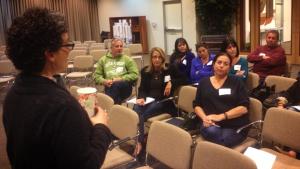What do you say to your kid when...?
This was a frequently asked question last night at Congregation Or Ami's Center for Jewish Parenting program on talking with your kids about sex and sexual ethics where I had the honor of being the guest teacher.
What do you say to your kid when he asks what you did when you were his age?
What do you say to your 13 year old before she heads off to sleep-away camp for the first time?
What do you say to your daughter when she sees something overtly sexual on TV that perhaps she doesn't understand?
What do you say to the carpool kids in the back seat of the car when they are talking about whose hooking up and whose "doing it"?
What do you say to your son when he asks, "How do I know when I am ready to have sex?"
Such hard and scary questions. Such real questions. We've all been there as parents, aunts, uncles, go-to-adults in the lives of our youth. And if we haven't been there yet, we inevitably will be.
As I guided this group of sensitive, open-minded, and eager-to-find-guidance group of parents through our conversation about Jewish values and Jewish sexual ethics, we came to some really important understandings about navigating our way through this part of parenthood.

1. There are no cookie-cutter answers to any of these questions. Answers come from our own hearts, from our understanding of the role that Judaism plays in our lives, from our articulation of what we believe and what we want our children to hold as their beliefs. As one parent succinctly put it: My response to my child always begins with "this is what our family does."
2. Answers are based on what a child is ready to hear and ready to understand. Listening to their verbal cues and observing their reaction is important. One parent shared her experience of reading a book with her daughter about relationships and sex. She said to her daughter, "We will read this together each night. We will read as long as you feel comfortable. Once you've said 'awkward!'(said in that adolescent lilt) three times, we will stop for the night." Slowly, but surely, they made their way through the book together, had meaningful conversations, and did it at her daughter's pace.
3. As my colleague Rev. Debra Haffner has said, it's not about the "big talk." It's about laying a foundation in which our kids know that the door is always open for conversation. When we build relationships with our children that are open to dialogue and safe conversation, our kids are more likely to come to us with their questions and concerns. This begins when they are very young and God-willing will continue throughout their lives.
4. Sometimes the best answer to a question is a question. How rabbinic. Rather than pontificating or giving hard and fast answers that shut down conversation, we should help our kids explore and understand their own questions. What are they really asking? What do they think? How do they feel? In this gentle way, we guide and teach our kids to hear what their own inner voice is telling them. When we do this, we give our kids the skills they need to listen to that inner voice that will always be with them - even when we aren't.
5. Always say "I LOVE YOU." No matter what the question, no matter what the dilemma our kids face, we must always, always let them know that we love them, and will always love them. Our kids will make mistakes. They will have regrets. Knowing that we are always there for them, that we will always love them - no matter what those mistakes - is vital for their growth and development into healthy, strong self-sufficient adults.
Cross posted from rabbilnw.com
